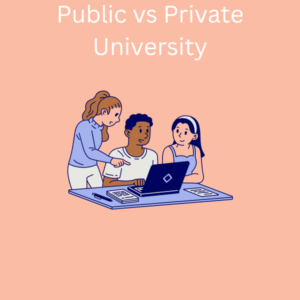When choosing a college, students’ most significant decision is whether to attend a public vs private university. Both types of institutions have their unique characteristics, advantages, and challenges. Let’s break down the differences and help you understand what might be the best fit for you.

Understanding Public vs. Private University
What is a Public University?
Public universities are funded primarily by state governments. This government funding allows these schools to offer lower tuition fees, especially for in-state students. Public universities tend to have larger student bodies and often provide a wider range of academic programs and degree options. Because of their size and funding, public universities typically have extensive resources, research facilities, and extracurricular activities available to students.
Well-known public universities include Purdue University and the University of California system. Public colleges and universities often have larger campuses and a diverse student population, attracting both local and international students.
What is a Private University?
Private universities, on the other hand, are funded primarily through tuition fees, private sources, and donations. They do not receive government support, which means tuition can be higher than at public institutions. However, private universities often offer substantial financial aid options, making them affordable for many students. Private colleges tend to have smaller student bodies, which can lead to a more comfortable learning environment. Many private colleges are known for their strong campus culture and close-knit communities.
Some private universities, like Harvard University and other Ivy League schools, are known for their rigorous admissions criteria, prestigious programs, and abundant resources. Private research universities and institutions can offer specialized programs, a focused curriculum, and smaller class sizes, which might appeal to students seeking a more personalized education experience.
Key Differences Between Public and Private Universities
- Funding and Tuition: State governments typically fund public universities, resulting in lower tuition fees for in-state students. Private universities rely on tuition and private sources for funding, often leading to higher tuition fees. However, many private universities offer generous financial aid packages.
- Student Body Size: Public universities usually have larger student populations, offering various degree programs and extracurricular activities. Private universities often have fewer students, which can lead to a more intimate learning environment and closer relationships between students and faculty.
- Academic Programs: Public universities tend to have a broad selection of majors and degree programs catering to diverse academic interests. Private universities might offer fewer academic majors but often provide specialized or prestigious programs.
- Campus Culture: Campus life at public universities is often vibrant and diverse due to the larger student body and wide array of activities. Private colleges, however, may have a more personalized and community-oriented atmosphere, which can appeal to students who prefer a smaller and closer-knit environment.
- Research Opportunities: Both public and private universities offer research opportunities, but public universities might have more extensive resources due to government support. Private universities, however, may offer more targeted research programs in specific fields.
Deciding Between a Public or Private University
Your choice between a public and private university may include several factors, including your personal preferences, financial situation, and academic interests. Here are some aspects to consider:
- Tuition and Financial Aid: While public universities typically offer lower tuition costs, especially for in-state students, private universities often provide significant financial aid opportunities that can offset the higher sticker price.
- Campus Visits: This can help you get a feel for the environment at both public and private universities. Consider what type of learning atmosphere you’re looking for—whether it’s a bustling campus with a large student body or a smaller, more intimate college setting.
- Academic and Extracurricular Preferences: Consider what educational programs and extracurricular activities are essential to you. Public universities might offer a broader range of options, while private colleges may have specific programs that cater closely to your interests.
- Long-Term Goals: Consider how each type of institution aligns with your long-term goals, whether participating in research, attending a well-known graduate program, or seeking specific career opportunities.
Frequently Asked Questions (FAQs)
Q: What is the main difference between public and private universities?
A: The main difference lies in funding and tuition. Public universities receive government funding and generally have lower tuition for in-state students. In contrast, private universities rely on tuition and private funding, which can lead to higher tuition costs and more substantial financial aid packages.
Q: Are private universities better than public universities?
A: It depends on your needs and preferences. Private universities often offer a more intimate learning environment and specialized programs, but public universities may provide a more affordable education and a wider variety of programs.
Q: Which type of university offers better financial aid?
A: Private universities often have more substantial financial aid packages, which can make them affordable despite higher tuition fees. However, public universities also offer financial aid, especially for in-state students, and tend to have lower overall tuition costs.
Q: Do private universities have better research facilities than public universities?
A: Both types offer research opportunities, but public universities may have more extensive facilities due to government support. Private universities, however, often have targeted research programs and might provide more personalized support in specific fields.
Q: How can I decide between a public vs private university?
A: Consider factors like tuition, financial aid, campus culture, programs, and student body size. Visiting campuses and talking to current students can also give you a better sense of which environment might best fit you.
